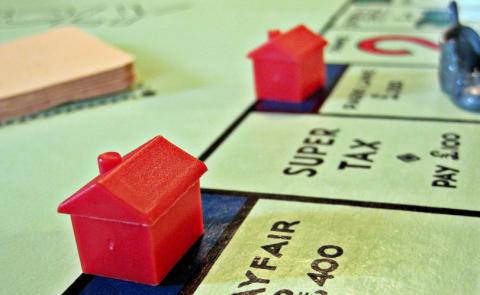Fine Gael come out against flat rate household charge?

The EU-IMF Memorandum of understanding makes no mention of a flat-rate household charge. Luckily the Government parties - both of whom campaigned against it - don't intend to introduce one. Oh, wait...By Michael Taft.
Stop the presses! Fine Gael has come out against a flat-rate household charge. All you wild and wacky lefties can put away your signs, leaflets and banners – the senior Government party is in agreement with you. I don’t know where this leaves Minister Hogan, but the Fine Gael party has made their position crystal clear: no flat-tax.
At one level I’m not surprised. The flat-rate tax is just about the most socially inequitable and economically inefficient tax you could dream up. And if that weren’t bad enough, it is wholly unnecessary. Even the Marquis of Dewsbury threw a fit in the House of Lords over flat-rate taxes.
However, it seemed that Minister Hogan was determined to railroad through the cabinet some manner of flat-rate charge on householders. So Fine Gael’s recent declaration on the charge is certainly welcomed. And they pull no punches. On the equity issue they say:
‘. . . [a] flat rate charge means that houses in standard neighbourhoods worth a fraction of some mansions will pay the same rate of tax. It will be difficult to pay for asset‐rich but income poor households, particularly the elderly and the unemployed; and it will be deeply unfair for a young generation that paid exorbitant amounts of stamp duty and VAT on the purchases on over‐valued houses, many of whom now find themselves in negative equity.’
Tough talk, coming from Fine Gael – ‘a fraction of some mansions’ (though I would have thought that ‘houses in standard neighbourhoods’ were worth a fraction of ‘all’ mansions. But let’s not get pedantic).
Fine Gael’s opposition to a flat-rate household charge is grounded in good economics. The Tax Strategy Group found that a €200 flat-rate charge would only raise €183 million once waivers are factored in. But as we all know, that wouldn’t mean the Exchequer would gain €183 million. The ESRI shows that the actual gain – once the impact on economic activity was factored in – would be less than €150 million. And that’s if it was truly a property tax – which is inherently progressive. A flat-rate charge is no such thing; therefore the economic impact would be even more deflationary and the gain to the Exchequer would be substantially less.
Fine Gael also probably had another read of the EU-IMF Memorandum of Understanding and found there is no mention of a flat-rate household charge. All it states is that Budget 2012 should make provision for a ‘property tax’, while Budget 2013 should make provision for ‘an increase in property tax’.
That’s fine. Minister for Finance Michael Noonan told the Dail that a tax on financial property, along the lines of the French tax, would yield between €400 to €500 million. And the great thing about such a tax is that it would have very little deflationary impact since such a tax would attach itself to the very highest incomes.
Of course, it would be difficult to bring in such a complex tax – with a strong compliance regime – within a few months. So as a transitional tax (and the flat-rate household charge was only intended to be ‘transitional) I would suggest a charge linked to home ownership and income – ranging from €100 to €1,000 on incomes starting at €50,000. This would raise a substantial amount but have a less deflationary impact meaning higher revenue for the Exchequer.
So Fine Gael’s opposition to flat-rate household charges – based on equity, efficiency and fiscal benefit – is most welcome. I say, fair dues to . . . oh . . . .em . . . wait a minute . . .
Oh boy, am I bad. I apologise.
I was quoting from Fine Gael’s election manifesto: Perspectives on Budget 2011. Something they published before they entered government. Apparently, while canvassing for people’s votes, Fine Gael assured us they were opposed to flat-rate charges.
I forget – what some people say when canvassing for votes sounds completely different when they actually get those votes.
[NOTE: I can now confirm I will not be putting up a post congratulating the Government for forcing bank bondholders to share the burden.]
[QUESTION: if Fine Gael campaigned against a flat-rate charge, and Labour campaigned against a flat-rate charge, and the EU-IMF makes no mention of it – why are we facing a flat-rate charge?]
notesonthefront.typepad.com
Image top: Images_of_Money.
